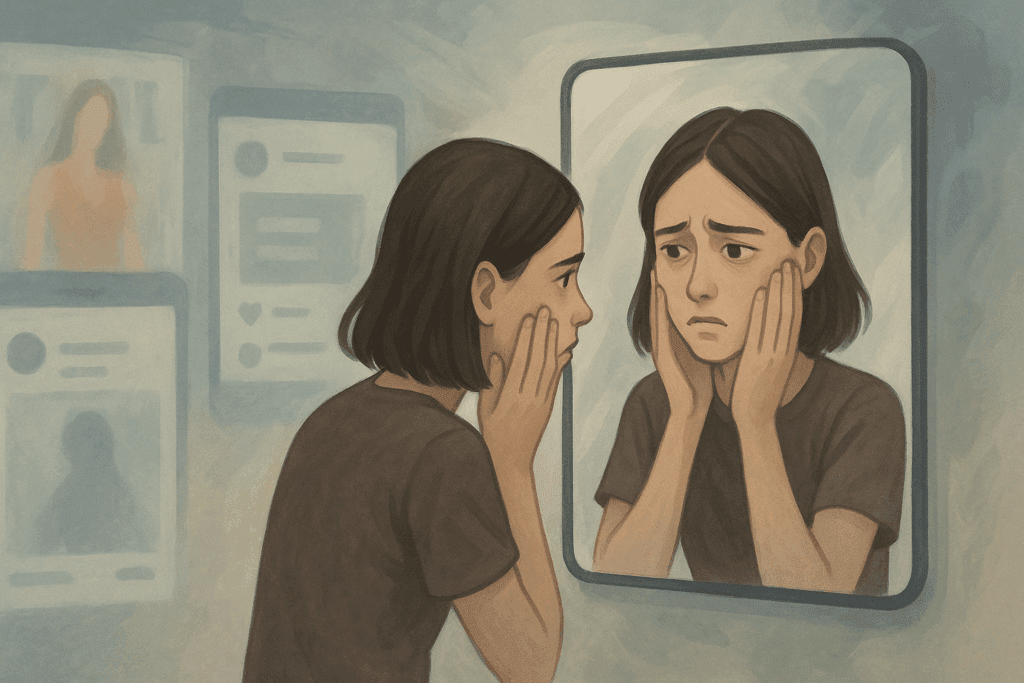The fear of gaining weight is an increasingly common concern, particularly in a world where media and societal pressures emphasize thinness as a standard of beauty and health. This fear, sometimes referred to as the fear of being fat or the fear of getting fat, can deeply affect mental, emotional, and physical well-being. It is not just a superficial concern about appearance but often a manifestation of deeper psychological distress, body dissatisfaction, and anxiety. When left unaddressed, this fear can lead to disordered eating patterns, excessive exercise, and a distorted relationship with food and body image.
You may also like: How to Stop Emotional Eating and Regain Control: Mindful Nutrition Strategies That Support a Healthier Lifestyle
However, overcoming this fear is possible with the right mindset, practical strategies, and professional guidance. By cultivating a healthier attitude toward food, body image, and overall well-being, individuals can break free from the cycle of fear and develop a more positive and balanced approach to their health. This article explores expert-recommended strategies to overcome the fear of gaining weight, with a focus on addressing root causes, building resilience, and fostering long-term psychological and emotional well-being.

Understanding the Root Causes of the Fear of Gaining Weight
To effectively address the fear of gaining weight, it is essential to understand its underlying causes. This fear often originates from societal expectations, personal experiences, and internalized beliefs about body image and self-worth. Social media, fashion magazines, and celebrity culture perpetuate unrealistic beauty standards that equate thinness with success, desirability, and control. Consequently, many individuals internalize these ideals, believing that any deviation from a slender figure signifies failure or a lack of discipline.
In addition, childhood experiences can shape one’s perception of body image and self-esteem. For instance, individuals who were criticized about their weight during childhood or witnessed family members obsessing over dieting may develop a heightened sensitivity to weight gain. Similarly, traumatic experiences, such as bullying or negative comments about one’s appearance, can create lasting emotional scars that fuel anxiety about gaining weight.
Moreover, perfectionist tendencies and a desire for control can intensify these fears. Individuals who strive for perfection in various aspects of their lives may view weight gain as a sign of losing control. This need for control often leads to rigid eating patterns, compulsive exercise, and an obsession with maintaining a certain body shape.

Challenging Cognitive Distortions and Negative Beliefs
One of the most effective ways to overcome the fear of gaining weight is to challenge cognitive distortions and reframe negative beliefs about body image. Cognitive distortions are irrational thought patterns that contribute to anxiety and self-criticism. Common distortions related to body image include black-and-white thinking (“If I gain weight, I’m a failure”), catastrophizing (“Gaining a few pounds will ruin my life”), and overgeneralization (“If I can’t maintain this weight, I will never be happy”).
To counter these distortions, individuals can practice cognitive restructuring by identifying and replacing negative thoughts with more realistic and balanced perspectives. For example, instead of thinking, “If I gain weight, I will lose control,” one might reframe it as, “My worth is not determined by my weight, and my body is capable of maintaining a healthy balance.” Engaging in cognitive-behavioral therapy (CBT) with a trained professional can provide additional support in challenging these thought patterns.

Embracing Intuitive Eating and Rejecting Diet Culture
Intuitive eating is a powerful approach that encourages individuals to listen to their body’s hunger and fullness cues rather than adhering to rigid dietary rules. By rejecting diet culture and embracing intuitive eating, individuals can develop a more harmonious relationship with food and their bodies. Diet culture promotes the idea that thinness equates to health and morality, often leading to cycles of restriction, binge eating, and guilt.
Intuitive eating consists of ten principles that guide individuals toward trusting their bodies and honoring their nutritional needs. These principles include rejecting the diet mentality, honoring hunger, making peace with food, challenging the food police, respecting fullness, and discovering satisfaction in eating. By practicing intuitive eating, individuals can break free from the cycle of chronic dieting and learn to nourish their bodies in a way that promotes physical and emotional well-being.
Developing Body Acceptance and Self-Compassion
Body acceptance and self-compassion are essential components of overcoming the fear of gaining weight. Body acceptance involves recognizing and respecting one’s body as it is, regardless of size or shape. Rather than striving for an unattainable ideal, individuals can practice gratitude for their bodies’ capabilities and resilience. Self-compassion, on the other hand, entails treating oneself with kindness and understanding, especially during moments of vulnerability.
Self-compassion involves three key components: self-kindness, recognizing common humanity, and mindfulness. Self-kindness encourages individuals to speak to themselves with the same warmth and empathy they would offer a friend. Recognizing common humanity reminds individuals that they are not alone in their struggles, as many people experience similar challenges with body image and self-esteem. Mindfulness allows individuals to observe their thoughts and emotions without judgment, creating space for self-reflection and growth.

Incorporating Mindfulness Practices to Reduce Anxiety
Mindfulness practices can play a significant role in reducing anxiety related to the fear of gaining weight. Mindfulness involves cultivating present-moment awareness and observing thoughts and feelings without attachment or judgment. By incorporating mindfulness techniques such as meditation, deep breathing, and body scanning, individuals can develop greater self-awareness and emotional resilience.
Mindful eating, in particular, encourages individuals to engage their senses and savor each bite, promoting a deeper connection with their food and body. This practice can help individuals identify true hunger and fullness cues, reducing the likelihood of emotional or binge eating. Additionally, regular mindfulness practice can decrease the intensity of anxiety and help individuals respond to stressful situations with greater calm and clarity.
Seeking Professional Support and Building a Support System
Overcoming the fear of gaining weight is not a journey that individuals must navigate alone. Seeking professional support from licensed therapists, dietitians, and mental health professionals can provide valuable guidance and evidence-based strategies for addressing these fears. Cognitive-behavioral therapy (CBT), dialectical behavior therapy (DBT), and acceptance and commitment therapy (ACT) are effective therapeutic approaches that can help individuals challenge distorted beliefs, regulate emotions, and develop healthier coping mechanisms.
Building a supportive network of friends, family members, and support groups can also create a sense of belonging and validation. Sharing experiences and receiving encouragement from others who have faced similar challenges can inspire hope and resilience. Furthermore, online communities and forums dedicated to body positivity and intuitive eating can offer additional resources and connection.
Setting Realistic Goals and Celebrating Progress
Setting realistic and achievable goals is essential for maintaining motivation and fostering a sense of accomplishment. Rather than focusing solely on weight-related goals, individuals can set objectives that prioritize overall well-being and self-care. These goals may include practicing self-compassion, incorporating regular movement that feels enjoyable, and experimenting with new nourishing recipes.
Celebrating progress, no matter how small, reinforces positive behavior and encourages continued growth. Acknowledging milestones such as recognizing hunger cues, challenging negative thoughts, or practicing self-care promotes a sense of empowerment and reinforces the importance of maintaining a balanced and sustainable approach to health.
Reframing Exercise as a Form of Self-Care, Not Punishment
Exercise should be viewed as a means of nurturing the body and enhancing overall well-being rather than as a tool for controlling weight. When exercise is associated with punishment or a means of “earning” food, it can perpetuate feelings of guilt and anxiety. Instead, individuals can explore different forms of movement that bring joy and fulfillment, such as yoga, dancing, hiking, or swimming.
Engaging in movement that feels pleasurable rather than obligatory fosters a positive relationship with physical activity. It allows individuals to appreciate their bodies’ strength and capabilities, reinforcing a sense of self-respect and gratitude. By shifting the focus from calorie burning to holistic well-being, individuals can cultivate a more sustainable and enjoyable approach to exercise.

Practicing Gratitude and Focusing on Non-Appearance-Based Qualities
Cultivating a gratitude practice can shift the focus away from appearance and weight by highlighting the positive aspects of life and the body’s inherent value. Practicing gratitude involves reflecting on aspects of life that bring joy, fulfillment, and meaning. By acknowledging non-appearance-based qualities, such as kindness, intelligence, creativity, and resilience, individuals can develop a deeper sense of self-worth and appreciation.
Journaling, expressing gratitude verbally, or taking moments of reflection throughout the day can reinforce this positive mindset. Over time, gratitude practice can help individuals detach their sense of self-worth from their physical appearance and embrace a more holistic view of their identity.
Redefining Health Beyond the Scale
True health encompasses more than just body weight or appearance. Redefining health involves considering multiple dimensions of well-being, including mental, emotional, and social health. When individuals shift their focus from a narrow definition of health centered on weight to a more comprehensive understanding, they can make choices that honor their bodies and promote overall vitality.
Engaging in nourishing eating habits, cultivating meaningful relationships, managing stress, and prioritizing rest are all components of a balanced and fulfilling life. By adopting a holistic view of health, individuals can let go of the fear of gaining weight and embrace a more sustainable and compassionate approach to self-care.

Embracing a Lifelong Journey Toward Self-Acceptance
Overcoming the fear of gaining weight is not an overnight transformation but a lifelong journey of self-discovery, growth, and healing. It requires patience, perseverance, and a commitment to challenging deeply ingrained beliefs about body image and worth. By cultivating self-compassion, practicing mindfulness, seeking support, and reframing negative thoughts, individuals can build a foundation of resilience and acceptance.
Every step taken toward embracing a healthier mindset contributes to a more profound sense of freedom and empowerment. By letting go of fear and embracing a holistic perspective on health and well-being, individuals can reclaim their lives and cultivate a sense of peace and contentment within themselves.
Frequently Asked Questions (FAQ)
1. How can I differentiate between a healthy concern for my weight and an irrational fear of gaining weight?
A healthy concern for maintaining an optimal weight focuses on balanced nutrition, regular physical activity, and overall well-being. It involves making mindful choices that promote health without causing anxiety or distress. However, the fear of gaining weight goes beyond this, often leading to obsessive behaviors, constant body checking, and an overwhelming sense of anxiety when weight fluctuates. This fear may cause individuals to restrict food intake, engage in excessive exercise, or experience feelings of guilt after eating. A key distinction lies in emotional responses—while healthy concern encourages positive actions, the fear of getting fat is driven by negative emotions and distorted beliefs about body image. If thoughts of weight gain dominate daily life or lead to harmful behaviors, professional intervention may be necessary.
2. Can the fear of being fat contribute to the development of eating disorders?
Yes, the fear of being fat is a significant risk factor for the development of various eating disorders, including anorexia nervosa, bulimia nervosa, and binge-eating disorder. This fear often triggers extreme dietary restriction, purging behaviors, or episodes of emotional eating, as individuals attempt to control their weight. Over time, the constant preoccupation with body size can lead to a cycle of guilt, shame, and emotional distress. Research shows that individuals who internalize societal pressure to maintain a thin physique are more likely to develop unhealthy relationships with food. Early intervention, such as cognitive-behavioral therapy (CBT), can help address these fears and prevent the progression of eating disorders by promoting healthier coping mechanisms and fostering body acceptance.
3. How does social media exacerbate the fear of gaining weight?
Social media platforms, particularly those that emphasize image-based content, contribute significantly to the fear of gaining weight by perpetuating unrealistic beauty standards. Influencers and fitness enthusiasts often showcase highly curated images that promote an idealized version of health and attractiveness. Exposure to these images can create a distorted perception of normal body shapes and sizes, leading individuals to compare themselves unfavorably. Moreover, social media algorithms reinforce content that aligns with users’ insecurities, deepening feelings of inadequacy. To combat this influence, individuals can curate a healthier online environment by following accounts that promote body positivity, diversity, and mental health awareness. Limiting time spent on social media and practicing mindful consumption of content can also mitigate its negative impact.
4. Are there specific personality traits that make someone more prone to the fear of getting fat?
Certain personality traits can predispose individuals to develop a fear of getting fat. Perfectionists, for example, often strive for control and flawlessness in every aspect of life, including their physical appearance. This intense desire for perfection can lead to rigid dieting and an obsession with maintaining a certain weight. Similarly, people with high levels of anxiety or obsessive-compulsive tendencies may become fixated on weight-related concerns, viewing weight gain as a threat to their self-worth. Low self-esteem and a history of trauma, such as bullying or body shaming, can also contribute to heightened sensitivity about weight changes. Recognizing these traits and addressing them through therapy can help individuals develop healthier thought patterns and coping strategies.
5. How can I manage anxiety associated with the fear of gaining weight during life transitions?
Life transitions, such as starting college, pregnancy, or menopause, often bring about changes in routine and body composition, which can intensify the fear of gaining weight. Managing this anxiety involves anticipating these changes and approaching them with self-compassion and realistic expectations. Practicing mindfulness can help individuals stay present and reduce catastrophic thinking about future weight changes. Establishing a support system, whether through friends, family, or a therapist, provides emotional validation and reassurance. Additionally, setting non-weight-related goals, such as improving strength, increasing energy levels, or focusing on emotional resilience, can shift attention away from fear and toward holistic well-being.
6. Can hormonal fluctuations increase the fear of being fat?
Yes, hormonal fluctuations, particularly those related to menstrual cycles, pregnancy, or menopause, can heighten the fear of being fat by causing temporary changes in body weight, water retention, and mood. For example, during the luteal phase of the menstrual cycle, many women experience bloating, increased appetite, and mild weight fluctuations. These changes can trigger anxiety in individuals who are highly sensitive to variations in their body shape. Understanding that these fluctuations are a normal part of the body’s natural processes can alleviate fear. Tracking cycles and identifying patterns can also empower individuals to differentiate between temporary changes and lasting weight gain, fostering a more rational and compassionate response.
7. What role does emotional regulation play in overcoming the fear of getting fat?
Emotional regulation is a critical factor in managing the fear of getting fat because it helps individuals respond to distressing thoughts and emotions in a balanced and constructive manner. Poor emotional regulation can lead to impulsive behaviors, such as emotional eating or excessive exercise, as a way of coping with anxiety related to weight gain. Developing emotional intelligence through mindfulness, journaling, and therapy enables individuals to recognize triggers, process emotions effectively, and reframe negative thoughts. Over time, enhanced emotional regulation allows for a more measured response to weight-related concerns and fosters resilience in the face of body image challenges.
8. How can parents prevent their children from developing a fear of gaining weight?
Parents play a pivotal role in shaping their children’s attitudes toward body image and preventing the fear of gaining weight from taking root. Modeling a positive relationship with food and body image sets a healthy foundation for children. Parents should avoid making negative comments about their own or others’ bodies and refrain from discussing diets or weight loss in front of their children. Encouraging intuitive eating and allowing children to listen to their hunger and fullness cues fosters trust in their bodies. Open conversations about media literacy can also help children critically evaluate societal beauty standards and develop resilience against unrealistic ideals. By creating a supportive and body-positive environment, parents can promote self-confidence and body acceptance in their children.
9. How can individuals cultivate resilience against societal pressure to remain thin?
Cultivating resilience against societal pressure requires a multifaceted approach that emphasizes self-awareness, critical thinking, and boundary-setting. Individuals can build resilience by consciously challenging the cultural narrative that equates thinness with worth and success. Engaging in media literacy helps individuals recognize and reject unrealistic beauty standards, empowering them to redefine health and beauty on their own terms. Developing a strong support system that reinforces positive body image and practicing self-compassion in moments of self-doubt strengthens emotional resilience. Additionally, setting boundaries with toxic environments or relationships that perpetuate body shaming can protect individuals from negative influences and promote lasting self-acceptance.
10. Are there emerging therapies or treatments that address the fear of being fat?
Emerging therapies are offering promising solutions for addressing the fear of being fat, combining evidence-based approaches with innovative techniques. Acceptance and Commitment Therapy (ACT) helps individuals accept their thoughts and feelings about body image without judgment while committing to behaviors aligned with their values. Exposure therapy, traditionally used for anxiety disorders, is being adapted to gradually expose individuals to situations that trigger anxiety about weight gain, allowing them to build tolerance and reduce fear over time. Additionally, virtual reality (VR) exposure therapy is gaining traction, offering a controlled environment where individuals can confront their fears and develop healthier coping mechanisms. These emerging therapies, along with traditional cognitive-behavioral approaches, offer new avenues for those seeking to overcome body image anxiety and achieve lasting peace with their bodies.
Final Thoughts: Building a Positive Relationship with Your Body
The journey to overcoming the fear of gaining weight is ultimately about cultivating a positive and nurturing relationship with one’s body. It is about recognizing that true health and happiness extend beyond physical appearance and acknowledging the body’s remarkable capacity to support and sustain life. Through self-compassion, mindfulness, and a commitment to rejecting diet culture, individuals can liberate themselves from the grip of fear and embrace a more authentic and fulfilling way of living. By honoring their bodies and embracing self-acceptance, individuals can find lasting peace and confidence in their own skin.
Was this article helpful? Don’t let it stop with you. Share it right now with someone who needs to see it—whether it’s a friend, a colleague, or your whole network. And if staying ahead on this topic matters to you, subscribe to this publication for the most up-to-date information. You’ll get the latest insights delivered straight to you—no searching, no missing out.

